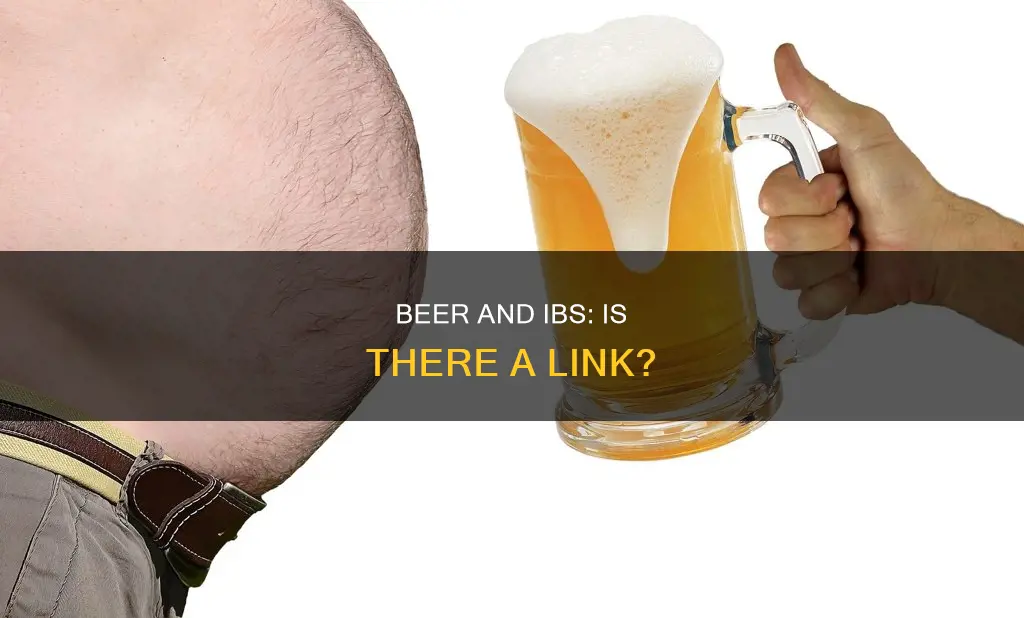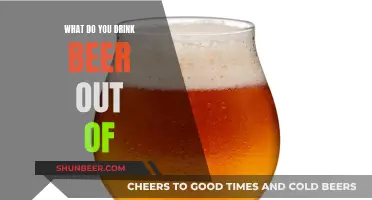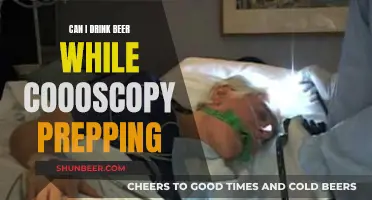
Irritable bowel syndrome (IBS) is a common gut disorder that affects millions of people worldwide. The symptoms vary but usually include abdominal pain, constipation or diarrhoea, bloating, and gas. While the exact cause of IBS is unknown, certain foods and drinks are known to worsen symptoms, including alcohol.
Alcohol is a toxin that can irritate the gastrointestinal (GI) system and may worsen gut symptoms. It can affect the digestive tract in several ways, including reducing nutrient absorption in the gut and speeding up the rate of digestion, which can cause diarrhoea.
Research suggests that drinking a large amount of alcohol over a short period may worsen IBS symptoms, particularly diarrhoea. Beer, in particular, seems to trigger IBS symptoms more frequently than other forms of alcohol, possibly due to the combination of alcohol and carbonation. However, drinking light to moderate amounts of alcohol may not increase IBS symptoms.
For people with IBS, it is important to understand how their body reacts to alcohol to determine how much they can drink without irritating their gut. Some people with IBS decide to eliminate alcohol altogether, while others choose to consume it in moderation.
| Characteristics | Values |
|---|---|
| Alcohol's effect on IBS | Alcohol is a toxin that can irritate the gut and worsen IBS symptoms. |
| IBS symptoms | Abdominal pain, bloating, gas, diarrhoea, and constipation. |
| Alcohol's effect on the digestive system | Alcohol reduces the absorption of nutrients in the gut and can speed up the rate of digestion, causing diarrhoea. |
| Alcohol's effect on the esophageal sphincter | Alcohol can weaken the esophageal sphincter, triggering acid reflux. |
| Alcohol's effect on the stomach | Alcohol can increase acid secretion in the stomach and slow down stomach emptying, causing nausea and vomiting. |
| Beer and IBS | Beer can trigger IBS symptoms more frequently than other forms of alcohol, possibly due to the combination of alcohol and carbonation. |
| Alcohol sensitivity and IBS | Each person's level of sensitivity to alcohol varies. Some people with IBS may experience symptoms after one drink, while others can consume larger amounts before symptoms appear. |
| Alcohol and nutrition | Excessive alcohol consumption can lead to nutritional deficiencies and a lack of key nutrients, which can worsen IBS symptoms. |
| Alcohol and stress | Alcohol may temporarily relieve stress but can increase stress levels over time, leading to IBS flare-ups. |
| Alcohol and bacterial overgrowth | Research suggests that alcohol may cause bacterial overgrowth and a leaky gut, resulting in long-term inflammation in the digestive tract. |
| Alcohol and diarrhoea | Drinking large amounts of alcohol in a short period can exacerbate diarrhoea, a common symptom of IBS. |
| Safe alcohol limits for IBS | Males should limit consumption to two drinks or less per day, and females to one drink or less per day. |
What You'll Learn
- Alcohol is a toxin that irritates the gut and worsens IBS symptoms
- Beer is a bigger IBS trigger than other alcoholic drinks
- Alcohol can cause bacterial overgrowth and leaky gut
- IBS sufferers should monitor their drinking to see how it affects their body
- IBS sufferers should limit alcohol intake to one drink a day for women and two for men

Alcohol is a toxin that irritates the gut and worsens IBS symptoms
Alcohol is a toxin that can irritate the gut and worsen IBS symptoms. It can affect the digestive system in several ways, causing adverse effects on gut health.
Firstly, alcohol can reduce nutrient absorption in the small intestine, leading to malabsorption of nutrients, particularly carbohydrates. This can cause problems with gas and diarrhoea as these substances interact with bacteria in the large intestine.
Secondly, alcohol can speed up motility (the speed at which matter moves through the digestive tract), increasing the risk of diarrhoea. It can also affect intestinal permeability and inhibit water absorption in the colon, further contributing to diarrhoea.
Additionally, alcohol weakens the oesophageal sphincter, triggering acid reflux. It can also increase acid secretion in the stomach and slow down stomach emptying, leading to irritation, nausea, and vomiting.
The impact of alcohol on IBS symptoms varies from person to person. Some people with IBS may experience symptoms after just one drink, while others can consume larger quantities before symptoms occur. Beer, in particular, seems to trigger IBS symptoms more frequently than other forms of alcohol, possibly due to the combination of alcohol and carbonation.
For individuals with IBS, it is important to understand how their body reacts to alcohol to make informed decisions about their alcohol consumption. Some people with IBS choose to eliminate alcohol altogether, while others may opt for moderate consumption or avoid specific types of alcohol that trigger their symptoms.
The Beer Choice of Misato: A Deep Dive
You may want to see also

Beer is a bigger IBS trigger than other alcoholic drinks
Beer is a carbonated alcoholic drink, and carbonation is known to be a trigger for IBS. Beer is also often made with barley, wheat, and rye, which are high in FODMAPs—a group of carbohydrates that have been linked to digestive symptoms in people with IBS. While the manufacturing process for beer converts most fructans into alcohol, there are still small amounts of gluten in beer, which can also be a trigger for IBS.
Beer is also typically higher in alcohol content than other drinks like wine or spirits. Since alcohol is a toxin that irritates the gastrointestinal (GI) system, a higher alcohol content means a higher likelihood of triggering IBS symptoms.
Many people with IBS report that their symptoms get significantly better when they stop drinking beer. Some people with IBS may still be able to drink small amounts of beer without triggering their symptoms, but for others, even one drink may be enough to cause a flare-up.
If you have IBS and want to drink beer, it's important to monitor your symptoms and adjust your intake accordingly. It may be helpful to try other types of alcoholic drinks that are lower in FODMAPs and gluten, such as vodka or gin.
Alcohol is a known irritant to the digestive system and can worsen IBS symptoms. It can affect the gastrointestinal (GI) system in several ways:
- Reducing the absorption of nutrients in the gut, leading to malabsorption of carbohydrates, which can cause problems with gas and diarrhea.
- Increasing the speed of motility (the movement of matter through the digestive tract), which can also contribute to diarrhea.
- Weakening the esophageal sphincter, triggering acid reflux.
- Increasing acid secretion in the stomach and slowing down stomach emptying, leading to irritation and nausea.
Tips for drinking with IBS
If you have IBS and choose to drink alcohol, there are some things you can do to reduce your risk of triggering symptoms:
- Limit your consumption to the recommended one or two drinks per day, with at least two alcohol-free days each week.
- Drink water between alcoholic drinks to stay hydrated and dilute the alcohol, making it less irritating to the digestive system.
- Eat food when you drink, as this can help protect the lining of your gut from irritation.
- Slow down your consumption to give your digestive system time to process the alcohol.
- Choose your alcohol and mixers wisely, opting for lower FODMAP and gluten-free options if you have a gluten sensitivity.
The Science Behind Beer Blizzard
You may want to see also

Alcohol can cause bacterial overgrowth and leaky gut
Alcohol can indeed cause bacterial overgrowth and a leaky gut.
Firstly, alcohol increases intestinal bacteria, leading to bacterial overgrowth. This overgrowth is stimulated directly by alcohol, but it can also be a byproduct of poor digestive and intestinal function caused by alcohol consumption. For example, studies have found a connection between alcohol, bile acid, and bacterial overgrowth. Alcohol can alter bile acid metabolism, and in turn, bile acids can affect intestinal bacteria.
Secondly, alcohol can cause a "leaky gut". A healthy gut lining acts as a barrier between the interior of the intestine, full of microbes, food, and potentially harmful toxins, and the rest of the body. Alcohol can cause the gut lining to become more permeable, allowing bacteria and other toxins to enter the bloodstream. This is caused by alcohol's impact on the tight junctions between the epithelial cells that make up the gut lining. Alcohol also causes cell death, which leads to changes in the intestine, including mucosal ulcerations, erosions, and loss of epithelium mainly at the villi tips.
The effects of alcohol on the gut can lead to a range of health issues, including liver disease, neurological disease, gastrointestinal cancers, and inflammatory bowel syndrome.
Beer Drinking on Kure Beach: What's Allowed?
You may want to see also

IBS sufferers should monitor their drinking to see how it affects their body
Drinking alcohol can be tricky for those suffering from irritable bowel syndrome (IBS). While some people with IBS have to eliminate alcohol from their diet completely, others can still enjoy an occasional drink. The bottom line is that it depends on how your body reacts to alcohol.
IBS is a common gut disorder that affects millions of people worldwide. The symptoms vary but usually include a combination of abdominal pain, constipation or diarrhoea, bloating, and gas. The exact cause of IBS is not known, but certain foods or drinks can trigger episodes of IBS, including alcohol.
Alcohol is a toxin that can irritate the gastrointestinal (GI) system and may worsen gut symptoms. It can affect the digestive tract in several ways. For example, alcohol can reduce the absorption of nutrients in the gut, speed up the movement of matter through the digestive tract, and weaken the oesophageal sphincter, triggering acid reflux. These effects can lead to a flare-up of IBS symptoms such as increased cramping, bloating, and diarrhoea.
Beer seems to trigger IBS symptoms more frequently than other forms of alcohol, possibly due to the combination of alcohol and carbonation. However, each person's level of sensitivity to alcohol may vary. Some people with IBS may experience symptoms after one drink, while others can consume larger quantities before symptoms appear.
If you have IBS, it is important to monitor how your body reacts to alcohol to determine how much, if any, you can drink without irritating your gut. Keep track of what you drink and how much, as well as any symptoms you experience. You can then adjust your alcohol intake accordingly.
If you are unsure whether alcohol bothers you, try eliminating it completely and see if your symptoms improve. Once your symptoms are stable, reintroduce a small amount of alcohol to see if it triggers your IBS. You can try this with different types of alcoholic beverages, such as beer, wine, or spirits, to see if some are more tolerable than others. Remember to always drink in moderation and stay within the recommended limits of no more than one drink per day for women and two drinks per day for men.
Vegan-Friendly Root Beer: What's the Deal?
You may want to see also

IBS sufferers should limit alcohol intake to one drink a day for women and two for men
Drinking alcohol can be a tricky business for those suffering from irritable bowel syndrome (IBS). Alcohol is a known irritant of the gut, and for those with a chronic digestive disorder, it can be a trigger for their symptoms.
The research on the relationship between alcohol consumption and IBS is limited, but it is understood that alcohol can irritate the gastrointestinal (GI) system and worsen IBS. It is a toxin that disrupts the bowels and intestinal system, and it can also affect intestinal permeability, leading to a "leaky gut".
For those with IBS, it is important to understand how your body reacts to alcohol, and to monitor your drinking habits. Some people with IBS may need to eliminate alcohol completely, while others can still enjoy an occasional drink. It is a personal decision, but it is recommended that alcohol intake is limited to one drink a day for women and two for men.
If you do choose to drink, there are some tips to reduce the risk of dealing with worsened IBS symptoms:
- Drink plenty of water to keep your body well-hydrated and to dilute the alcohol.
- Eat a meal before or with your drink to protect the lining of your digestive tract.
- Slow down your intake to give your digestive system time to process the alcohol.
- Limit consumption to the recommended one or two drinks per day, with two alcohol-free days each week.
It is also important to be mindful of what you mix your alcohol with. Many fruit juices are high in FODMAPs (fermentable oligosaccharides, disaccharides, monosaccharides, and polyols), which are carbohydrates that are poorly absorbed and can cause digestive symptoms in people with IBS. Low-FODMAP choices include cranberry juice and tomato juice.
While the research is limited, there is evidence that alcohol can negatively affect digestion and irritate the gut, so it is important for those with IBS to be cautious and to monitor their own reactions.
Beer and Eliquis: Safe Mix?
You may want to see also
Frequently asked questions
Irritable bowel syndrome (IBS) is a common gut disorder that affects between 10 and 15% of adults in the United States. It causes a range of intestinal symptoms, including abdominal pain, constipation or diarrhoea, bloating, and gas.
There is no clear evidence that alcohol can cause IBS. However, alcohol can irritate the gastrointestinal system and trigger IBS symptoms. Beer, in particular, is often reported to worsen IBS symptoms, possibly due to the combination of alcohol and carbonation.
Alcohol can irritate the gut and disrupt the intestinal system, leading to a flare-up of IBS symptoms. It can also affect the small intestine, oesophageal sphincter, and stomach, causing problems such as reduced nutrient absorption, acid reflux, and nausea.
The amount of alcohol that can be consumed without triggering IBS symptoms varies from person to person. Some people with IBS may need to eliminate alcohol completely, while others can still enjoy an occasional drink. It is recommended to stay within safe drinking limits: no more than one drink per day for women and two drinks per day for men.
If you have IBS and choose to drink alcohol, it is recommended to drink water, eat a meal, and slow down your consumption. Choosing low-FODMAP drinks and mixers may also help reduce the risk of triggering IBS symptoms.







